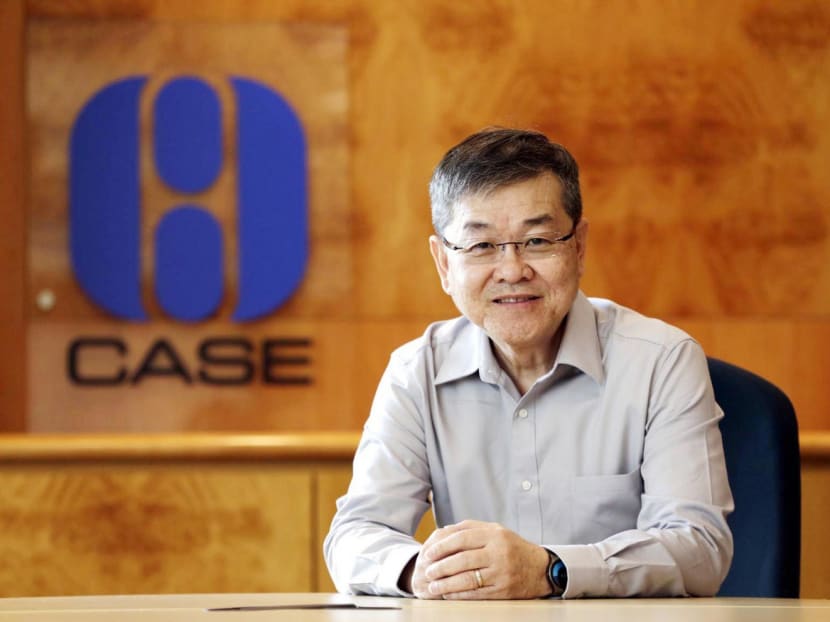‘Case has stood up to errant firms’
SINGAPORE — Away from the public eye and unbeknown to critics who feel that the consumer watchdog is toothless, the Consumers Association of Singapore (Case) has had to stand up to errant companies and fight legal battles, said Mr Seah Seng Choon, who has stepped down as the group’s executive director after more than a decade at the helm.

Mr Seah Seng Choon, outgoing executive director of Case, believes that the watchdog has been successful in protecting consumers’ rights despite having no legislative powers. Photo: Wee Teck Hian
SINGAPORE — Away from the public eye and unbeknown to critics who feel that the consumer watchdog is toothless, the Consumers Association of Singapore (Case) has had to stand up to errant companies and fight legal battles, said Mr Seah Seng Choon, who has stepped down as the group’s executive director after more than a decade at the helm.
Still, Mr Seah — who is now Case’s adviser after handing over the reins to his deputy, Mr Loy York Jiun — thinks that the watchdog has managed to achieve results despite having no legislative powers. He also does not think Case needs to have such powers, noting that Spring Singapore, which administers the Consumer Goods Safety Requirements as the safety authority, already has the powers to investigate, stop the sale of, or ban unsafe general consumer goods from the market.
Case announced yesterday that it had appointed Mr Loy, 43, to take over as the watchdog’s new executive director from Jan 1, while Mr Seah, 64, was re-appointed as an adviser.
Prior to becoming Case’s deputy executive director in April last year, Mr Loy had held various senior appointments within the National Trades Union Congress, including director of its Corporate Planning Secretariat.
In an interview with TODAY, Mr Seah felt that Case has come a long way since the early 2000s.
“Consumers were not quite educated back then when I first joined Case in 2002 (as executive director). They were not fully aware of their rights to redress, to seek compensation. But now, they know their rights better.”
In 2011, there were 22,240 consumer complaints, which jumped to 29,254 in 2013, before falling back to more than 22,000 in 2015, according to Case statistics. Mr Seah cited e-commerce transactions as one area of growing concern.
“Complaints involving e-commerce transactions are on the rise, and this is something we need to watch out for. We should have some regulations put in place,” he said, adding that Case had engaged the authorities on this issue.
Case figures show that the number of complaints involving online transactions was 485 in 2014, rising to 523 in 2015, and 636 between January and November last year.
Looking back at his years at the helm, Mr Seah cited the passing of legislation that has helped to protect consumer rights — such as the Consumer Protection (Fair Trading) Act, as well as the Lemon Law — as among the many milestones for Case. The watchdog had lobbied for such laws, and Mr Seah said he was “glad I could play a part” in getting them passed.
He also singled out the CaseTrust accreditation as something he was proud of, as he felt that it had helped to push businesses to adopt fairer practices.
Milestones aside, Mr Seah has also had his fair share of unpleasant episodes as Case’s executive director. He admitted that while trying to strong-arm businesses into doing things the right way, the consumer watchdog had inadvertently “rubbed people the wrong way”.
Around 2003, for instance, Case got into a tussle with insurer AIA Singapore, over life insurance policies with Critical Year features that were sold to the public. AIA had promised customers that after a certain number of years, the policies would become self-funding and they would not have to pay any more premiums. But as it turned out, premiums were still being deducted.
“I remember the AIA case vividly, we fought them because of this issue. We highlighted this to consumers, some of whom was not aware. At one point, about 700 consumers came to us for assistance, and it was simply overwhelming,” Mr Seah recalled.
“AIA actually warned us that they would take action, but we did not budge. Eventually they relented, and announced a support package for affected policyholders.”
Mr Seah said as executive director, he was guided by one principle: Be fearless in doing the right thing. Case has not only stood firm in the face of companies’ wrath, it has also responded to lawsuits filed by some businesses — and won.
“We will encounter all sorts of errant businesses that will not agree with what we tell them to do, and we receive a lot of threatening emails. But our message is this: Correct your behaviour or we will take you on,” he said.






